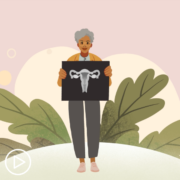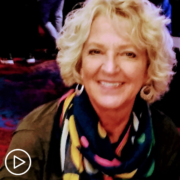How Can Prostate Cancer Disparity Gaps Be Overcome?
How Can Prostate Cancer Disparity Gaps Be Overcome? from Patient Empowerment Network on Vimeo.
How can research bridge the gap in prostate cancer outcomes among different demographics? Dr. Ronald Chen from University of Kansas Medical Center speaks to the work he and his colleagues are conducting around prostate cancer disparities and the different outcomes for different populations of patients who have the same diagnosis.
[ACT]IVATION TIP:
“My activation tip for this question is, my team’s research on how patients make decisions and the barriers has really led to a lot of insights that now allows us to implement programs to help tackle these barriers. And so I would advocate for any cancer patient to be willing to volunteer for a research study if one presents itself as an opportunity. It’s only through patients sharing their time and knowledge with researchers can we really learn about these critical issues, and then the participation will help future patients.”
See More from [ACT]IVATED Prostate Cancer
Related Resources:

Are There Worldwide Links to Aggressive Prostate Cancer? |

|

|
Transcript:
Lisa Hatfield:
Dr. Chen, are there any ongoing or upcoming projects in your research group that aim to bridge the gap in prostate cancer outcomes between different demographic groups?
Dr. Ronald Chen:
Yes. One of my areas of research focus is prostate cancer disparities and the different outcomes, different groups of patients have with the same diagnosis. We know from a lot of research from my group and other groups, is that in prostate cancer, there are large disparities.
One example is that Black patients with prostate cancer have twice the mortality rate as white patients with prostate cancer. That’s been known for quite some time. But what causes some patients to die twice as much as others is not as much known. And I’ve done a lot of research to look at this area. Part of this mortality disparity relates to the understanding that some patients for some reason choose less aggressive treatment than others. So if you have an aggressive prostate cancer, but you’re choosing less aggressive treatment than others, then that may explain some of the higher rates of death.
And so what my group has done is to try to figure out why some patients choose less aggressive treatment and what that decision-making process looks like. I’ve had a large project where I have been following about 1,500 men with prostate cancer, it was a…what’s called an observational study where we enroll these 1,500 patients at the time of diagnosis. So as soon as they were diagnosed, we enrolled them and what we asked them is, “Hey, do you mind if we just follow you along with your course through treatment, through your survivorship course? We want to follow and just learn what you decide to do and why you decided to do it, and what your outcomes are.”
And for these 1,500 men, we have now followed them for about 10 years, really going through the journey with them and trying to learn as much as we can. And part of this study was when these men were making decisions about treatment, we were able to ask them a series of questions to really try to tease out, “Why did you choose this versus that? How did you make your treatment process?” And this was a very unique study because actually, there are very few studies that have went through the process of decision-making with men and trying to tease out what’s important to them.
What we learned from this research, from this study, from these men who volunteered their time with us, is that some patients who had pretty aggressive prostate cancer told us that their cancer was not aggressive. So we know by following these patients, we know from their medical records what their diagnosis was, and we knew how aggressive the cancer was. But when we asked these men to tell us what their perception was with their diagnosis, a portion of these men who had aggressive cancer told us that their cancer wasn’t that aggressive.
And we found that people who thought that their cancer was not aggressive, those were the patients who ultimately chose less aggressive treatment, because they didn’t think it was that important, it wasn’t that aggressive. And so, part of what we learned from this study was that a patient’s understanding of their diagnosis is a really critical factor in making the right decision.
Another piece that we learned from going through this process with these patients was that there was also a portion of the men who have financial concerns when they’re making the decision about treatment. Financial concerns relate to, “Well, I’m concerned that this treatment will impact my ability to work, I’m concerned about the cost of this treatment, I’m concerned about how this treatment will impact my family’s burden having to take care of me.” Those are all financial considerations.
And patients who had these concerns were also more likely to choose treatment that’s not as aggressive. And so we found out through this process, through these men sharing their decisions with us, that an accurate understanding of the diagnosis and some of these financial concerns really drove decisions of treatment for prostate cancer patients.
So now that we understand that, the question is, what is the next step? What can we do to help alleviate this problem? Because I think we can’t take away these concerns, and if patients have the right treatment, that will improve and optimize their outcome as well, and reduce disparities.
And so part of what we’re doing here at University of Kansas is that we have really increased the availability of financial navigators and social workers for cancer patients. We know that a portion of cancer patients have financial concerns. We know that we don’t do as good of a job identifying patients who have concerns and then finding resources to help them.
Maybe it’s transportation, maybe it’s cost of treatment, maybe it’s the drug cost, and being able to identify these concerns early and finding resources to help would also, if we remove this barrier, then patients will be able to choose treatment that’s right for them without those concerns. And so, that’s one thing that we’re doing, now that we understand that’s an issue, we’re doing that to see if we can tackle and reduce this problem.
So my activation tip for this question is, my team’s research on how patients make decisions and the barriers has really led to a lot of insights that now allows us to implement programs to help tackle these barriers. And so I would advocate for any cancer patient to be willing to volunteer for a research study if one presents itself as an opportunity. It’s only through patients sharing their time and knowledge with researchers can we really learn about these critical issues, and then the participation will help future patients. And so, I would advocate for anybody to volunteer for research study, if that’s something they’re willing to do.










